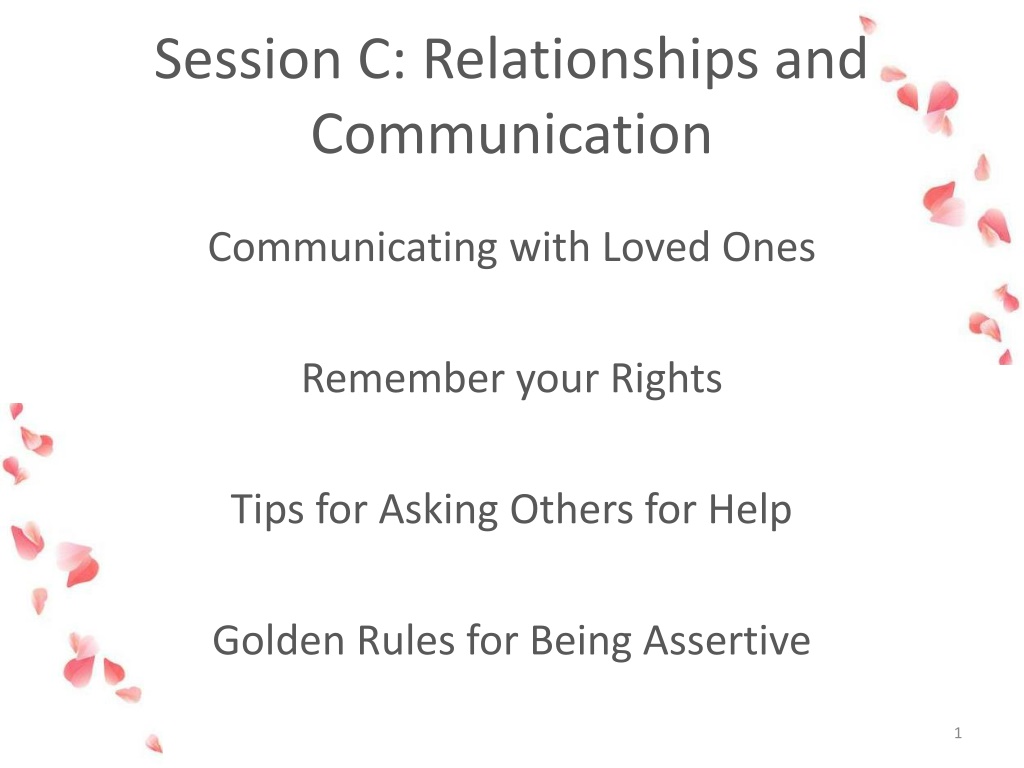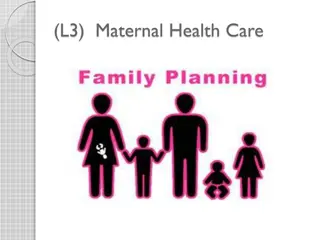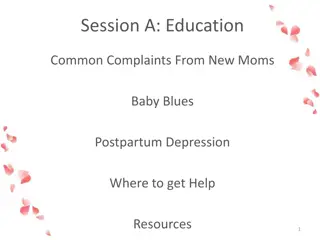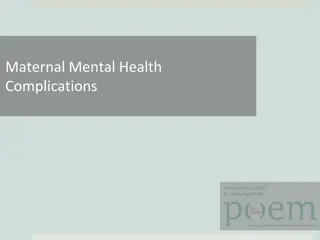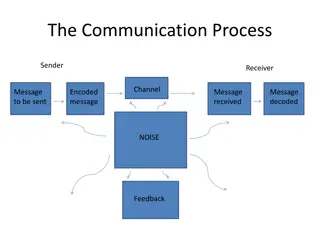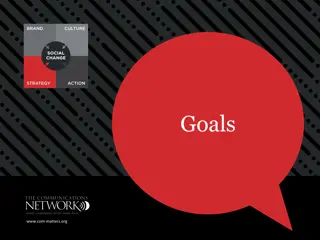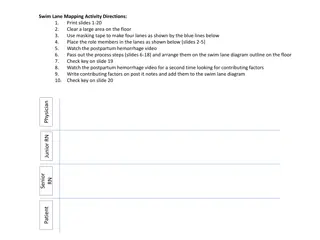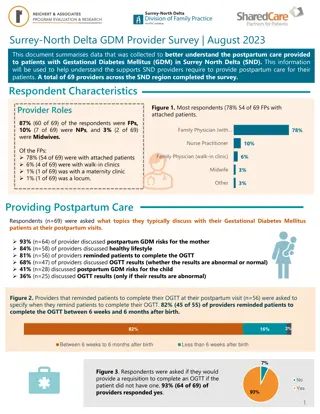Postpartum Relationship Challenges and Communication Strategies
Explore common relationship challenges faced by postpartum women, including issues with partners, extended family, and the relationship with the infant. Learn effective communication tips and strategies to navigate these challenges, maintain emotional intimacy, and seek help when needed.
Download Presentation

Please find below an Image/Link to download the presentation.
The content on the website is provided AS IS for your information and personal use only. It may not be sold, licensed, or shared on other websites without obtaining consent from the author. Download presentation by click this link. If you encounter any issues during the download, it is possible that the publisher has removed the file from their server.
E N D
Presentation Transcript
Session C: Relationships and Communication Communicating with Loved Ones Remember your Rights Tips for Asking Others for Help Golden Rules for Being Assertive 1
Session C Reviewing Homework Welcome and Check-in Reviewing Homework Ask how it went, how did they feel afterwards, trouble shoot difficulties Emphasize the importance of continuing the contract every week-view as appointments Encourage women to keep doing pleasant activities and relaxation exercises weekly The more enjoyable things you do, the better you are likely to feel. The more you practice relaxing the less stressed you will feel 2
Common Relationship Challenges for Postpartum Women 3
Relationship with Partner Lack of Help and Violated Expectations Housework Childcare (e.g., feeding, diapering, babysitting) Sex Interest, Pain, Attractiveness Lack of Emotional Intimacy Partner too absorbed in other activities Conflict about time spent with baby and time for partner 4
Womans Extended Family Lack of Help and Violated Expectations Mentoring from mother Emotional and physical support Level of interest Satisfaction with frequency and quality of contact 5
Common Interpersonal Disputes Disputes occur when: Expectations for receiving help with the baby Expectations for receiving help with household chores are not met Change in interpersonal intimacy and/or sexuality Family visits 6
Relationship with Infant Violated expectations Ambivalent feelings-strongly attached and resenting loss of spontaneity Cutoff from family and support Concerns about incorporating a new child, if other children Question ability to love another child or new infant Resentful of extra workload Impact on relationship and career Self-blame for child problems Impulse to harm baby 7
Session C Relationships Psychoeducation on Relationships Relationships can be a lot of work. People can have different expectations of the relationship and these can change with different circumstances, stressors. Having a baby places greater and/or different relationship pressures Needs and priorities change but others maybe unaware of the shift Having a baby can place a great deal of stress on partnerships. Many people experience more conflict, because there are just so many more demands on parents to manage Often difficult to get the support you deserve Reemphasize that having great support is amazingly protective against sadness and depression during stressful times, like having a baby. 8
Session C Relationships Evaluating an important adult relationship. Start thinking about your relationships now, ask who will be there to help you, give you the support you need after having the baby. Write down the name of someone important to you Ask: How satisfying is this relationship? Is it supportive overall? What changes would you like to see? Does it feel like a safe relationship to talk over concerns or problems? How are problems dealt with inside of this relationship? Are conflicts expressed? 9
Session C Interpersonal Disputes Types of arguments that tend to take place within a relationship (1) Give and take : people are openly aware of differences, and are actively trying to bring about changes. (e.g., household chores, visiting times for father/family, recreation) (2) Silently resentful: discussion has stopped, and resentment may continue to bubble. People avoid hot button issues due to fear of hurting, concern person will not change, want to remain positive (3) Cannot be fixed: the relationship cannot be repaired, both parties are going there own way emotionally 10
Session C Assertiveness Psychoeducation on Assertiveness What you could do before may change once your baby is here (provide examples, e.g., could say yes to babysitting for family, doing others laundry, etc.) Explain bucket principle allowing irritations to build until spill over Ask How easy is it for you to ask for things? How well can you say no -Does it differ with different people? What makes it hard? What is assertiveness? 11
Session C Assertiveness Definition of Assertiveness Assertiveness is the ability to express your thoughts and feelings openly and directly to others, without turning them off. You have to recognize others have rights, as well as yourself. Rights Ask what rights do they have in a relationship Refer to Handout on Rights 12
Remember Your Rights It is OK to want or need something from someone else. I can insist on my rights and still be a good person. I sometimes have a right to assert myself, even if I may inconvenience others. I may want to please people I care about, but I don t have time to please them all of the time. The fact that I say no to someone does not make me a selfish person. I can still feel good about myself, even though someone else is annoyed with me. 13
Interpersonal communication is the key to this process: People who have difficulty asking for help will not receive it and will continue to suffer 14
Session C An Assertive Request Being assertive is a skill you can learn. It may be difficult at first To get the support you need, you will need to make an assertive request (ask for help, ask someone to change a behavior) Involves taking a risk. People feel better about themselves by taking some risks, taking charge of their lives, and being assertive Remind women once they have their baby it will be important to ask for help and get help 15
Session C Role play Role play ineffective communication and ask group for feedback Review handouts on Tips for Asking for Help, Do s and Don ts referring to the ineffective role play 16
Tips for Asking Others for Help TIMING: Choose a quiet time. Introduce the fact that you want to talk about something. NONVERBAL BEHAVIOR: Use an appropriate tone of voice, avoid threatening posture, make eye contact with the other person, face them directly. SAY SOMETHING POSITIVE: Sandwich the negative between positives. Start with a positive and end with a positive. 17
Golden Rules Criticize the behavior, not the person (say what you want them to do, not what you want them to be). Openly state your own feelings, or changes you would like. Do Rules Include: Avoid any attacks on the other person, any threats, or insulting statements about the other person. Ask them for what you want, (in contrast to telling them what they should do). Avoid: Never, should, and always. ( Thanks for being so understanding, I really appreciate it ). Deal with one issue at a time (in contrast to kitchen sinking ). Be willing to give to get. Turn the table: Ask them, what do you think we should do? 18
Golden Rules Judge or blame DON T RULES INCLUDE: Over-apologize Put yourself down Guess the other Give a whole list person s ( kitchen sinking ) intentions Beat around the bush Mind-read Tell the other person Expect people to what they should do know what you want them to do if you don t tell them 19
Session C Communication Ask women to think about an important relationship What are your difficulties, your concerns? What are your needs at this time? What are your goals for the relationship? Ask women to complete handout on Communicating with Loved Ones 20
Communicating with Loved Ones I would like to change my communication style with: ___________________________________________ 1. How is your communication style going with this person? (-10 to 0, communication style is going extremely badly; 1 to 10, extremely well). -10 -9 -8 -7 -6 -5 -4 -3 -2 -1 0 1 2 3 4 5 6 7 8 9 10 2. What are the two best things about how you communicate with this person? What kinds of things does this person say or do that make you happy? What makes this person special to you? ________________________________________ ________________________________________ 21
Communicating with loved ones 1. What are the two worst things about how you communicate with this person? What kinds of things do they do that are hard on you? What kinds of things do they forget to do? Do you feel like you get enough time/attention/caring from this person? ___________________________________________________ 2. Interpersonal goals: What kinds of changes or support would you like from this person, other than what he or she does now? It is ok to want a person to give more or less of something they already do. It is also ok to ask for support to mean that a person stops doing something that hurts someone s feelings. If it is hard to identify kinds of support, sometimes it is helpful to think about what a person could possibly say or do that would be helpful. ____________________________________________________ 22
Session C Role Play Ask women to think about the goals they set for person in communicating with loved ones handout. Complete Handout on Making an assertive request with that person (encourage women to start with low level conflict e.g., household chore) Review how women will present their requests Role play a woman s current difficulty based on handout. Ask group for feedback 23
Homework on Making an Assertive Request 1. One change I will ask for this week _________________________________________________ _________________________________________________ _________________________________________________ 2. Because I want them to listen without feeling upset, I need to be careful to: ________________________________________________ _________________________________________________ _________________________________________________ 3. Date I will try this on: _________________________________________________ 4. Person with whom I will try this: _________________________________________________ 24
Session C Homework Refer to handout on Homework on Making an Assertive Request Reminder to practice pleasant activities and relaxation Emphasize the importance of practice Wrap up Highlights of next session (trouble shoot any problems you had asking for help, negative communication, how to say no to a request, and how to plan for your future) 25
Session C Techniques: Communication Analysis (e.g., tone, content, non-verbal Problem Solving (ask questions-what would be another way of saying that? If I said this to you would you want to continue the conversation?) Role Playing Interventionist demonstrates ineffective communication Both interventionist and woman role play 26
Potential Difficulties Does not do Homework Normalize, reassure, use examples from other participants, use open-ended questions (what made it hard to do? Is there something you can do differently next time?) highlight the importance of practice, reiterate the purpose of the homework 27
Potential Difficulties Woman is unmotivated to change Assess for depression Encouragement Woman has overwhelming social adversity Identify formal and informal resources Set realistic goals and expectations 28
Potential Difficulties Woman reports no communication difficulties Normalize, gently probe, provide examples from other past participants, (e.g., difficulties/irritations are common and reasonable, difficulties does not mean relationship is problematic) Focus on lower-level conflict 29
Potential Difficulties Woman is reluctant to role play Gently discuss reasons for her reluctance, normalize her response, use a one-sided role play, use stop and start method, emphasize the merits of role- play Woman is reluctant to try the new style of communication Gently challenge her expectations concerning outcome, provide reassurance, normalize, explore fears . 30
